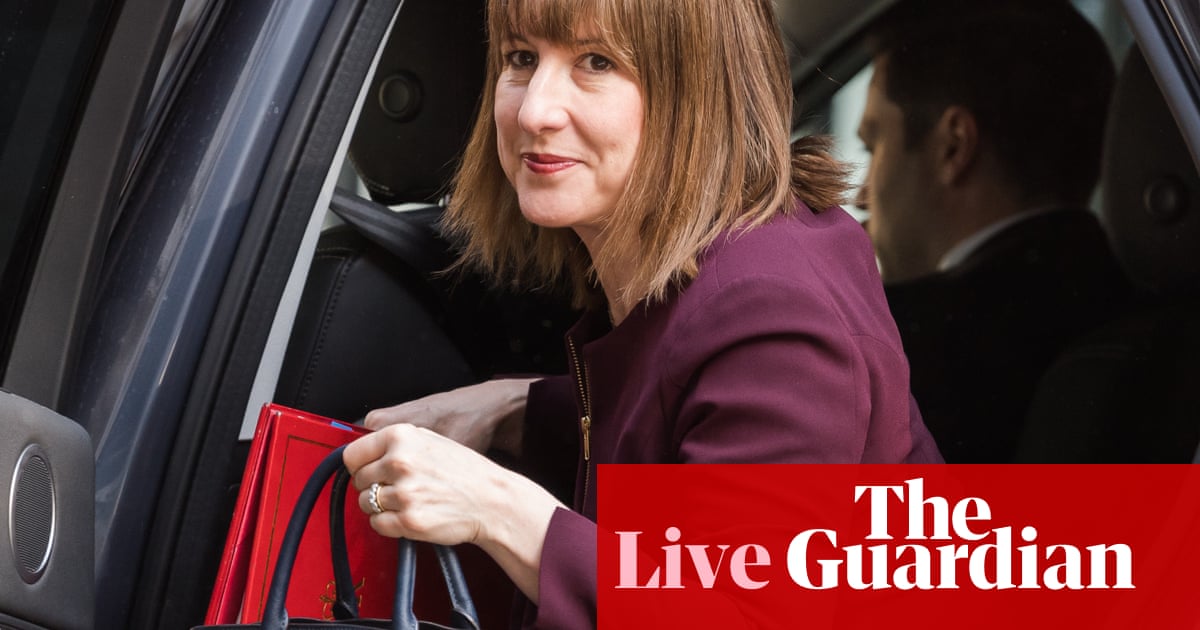TheTimes articlebyNick Williamsmentioned earlier (see9.07am) is worth reading in full. Williams gave up a job as a Treasury official to work as an economic policy adviser to Keir Starmer when he was opposition leader. He then worked for the PM in Downing Street as an adviser on planning, infrastructure and housing until last month.
Here are the main points he makes.
Williams says taxes will have to go up in the budget.He says:
He says the budget should be brought forward, and combined with the spending review, to avoid “months of tax speculation and uncertainty”.
He says changing the government’s fiscal rules would be “an invitation to disaster”.
He said the cuts to welfare cuts announced recently were less severe than they otherwise would have been because of the OBR’s estimate that planning reforms would be positive for growth.
The Times says Williams is referring to the government dropping a plan to freeze the value of Pip (the personal independence payments) as part of its welfare reform. The government is still drastically reducing Pip eligibility. But, for people who do get it, it won’t be frozen.
At 10.30am Robert Jenrick, the shadow justice secretary, has an urgent question in the Commons on “the public safety implications of the government’s plan to set a 28-day limit on prison sentences for recalled offenders”.
And later, after the business statement, the Foreign Office minister Stephen Doughty will make a statement on a review of sanctions implementation and enforcement. This will start at some point after 12pm
AndRachel Reeves,the chancellor, has delivered an almost identical message in a short, televised speech to workers at the Rolls-Royce factory in Derby. She said:
Keir Starmeris in Albania, where he has welcomed the growth figures. He told broadcasters:
Good morning. There is some good news for the government this morning. AsRichard Partingtonreports, the UK economy grew by a bigger than forecast 0.7% in the first three months of the year, defying business warnings of a collapse in confidence ahead of Labour’s tax increases and Donald Trump’s sweeping tariffs.
In a statement welcoming the figures,Rachel Reeves, the chancellor, said:
Reeves mentioned the US, Canada, France, Italy and Germany for a reason. They are all G7 members, and one of Keir Starmer’s“five missions”announced before the election was for the UK to have the highest sustained growth in the G7. The figures for the other G7 nation, Japan, are not available yet, although they arelikely to show the Japanese economy shrinking. It is only one quarter, but you can see why Reeves is keen to talk about this. She is giving interviews to broadcasters this morning.
But some of them may want to ask her aboutan article in the TimesbyNick Williams, a former Treasury official who worked as an adviser to Keir Starmer on economic policy, and then on planning policy, from 2023 until last month. Williams says that Reeves will have to raise tax in the budget. He says:
Here is the agenda for the day.
Morning:Rachel Reeves, the chancellor, is talking to broadcasters about the growth figures on a trip to Derbyshire.
9.30am:Heidi Alexander, transport secretary, takes questions in the Commons.
9.30am:NHS England publishes its monthly performance figures.
9.30am:The Ministry of Justice publishes quarterly figures on prosecutions and convictions.
10am:Kemi Badenochtakes part in a Q&A with former Canadian PM Stephen Harper at the International Democracy Union meeting in Brussels.
After 10.30am:Lucy Powell, leader of the Commons, takes questions on next week’s Commons business.
11.20am:Keir Starmeris in Albania where he is due to hold a joint press conference with the prime minister, Edi Rama. Later he will visit British troops and their Albanian counterparts training Ukrainian soldiers.
11.30am: Downing Street holds a lobby briefing.
Here is the agenda for the day.
If you want to contact me, please post a message below the line when comments are open (normally between 10am and 3pm at the moment), or message me on social media. I can’t read all the messages BTL, but if you put “Andrew” in a message aimed at me, I am more likely to see it because I search for posts containing that word.
If you want to flag something up urgently, it is best to use social media. You can reach me on Bluesky at @andrewsparrowgdn.bsky.social. The Guardian hasgiven up posting from its official accounts on Xbut individual Guardian journalists are there, I still have my account, and if you message me there at @AndrewSparrow, I will see it and respond if necessary.
I find it very helpful when readers point out mistakes, even minor typos. No error is too small to correct. And I find your questions very interesting too. I can’t promise to reply to them all, but I will try to reply to as many as I can, either BTL or sometimes in the blog.
